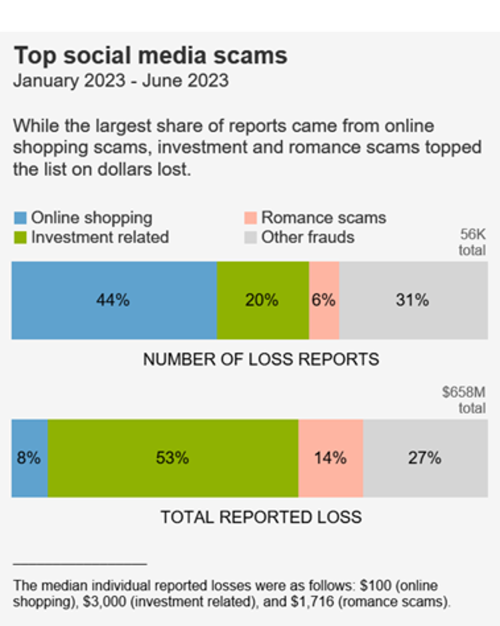Sometimes being the “Home of . . .” is an honorific to be proud of. Kudos, Cleveland, for rock ‘n’ roll, and thank you, Buffalo, for your contribution to chicken wings. But the Birthplace of Frauds and Scams isn’t a nickname to be envied. According to an FTC Data Spotlight, reports from consumers suggest that in many instances, that’s becoming a moniker for social media.
The Data Spotlight reveals that the most frequently reported losses to fraud in social media in the first half of 2023 were from people who tried to buy something. Many of those scams started with an ad on Facebook or Instagram. Consumers recounted stories of undelivered merchandise and lost money – no-show clothes and electronics topped the list – but that’s not the only way that scammers are using social media to sting people.

In the first half of 2023, more than 50% of the money consumers reported losing to fraud in social media went to investment scammers. A typical modus operandi may involve money-making promotions for purported investment opportunities, often using cryptocurrency as the hook. Scammers lure people to websites or apps with their own supposed “success stories,” but consumers ultimately end up empty-handed and with empty wallets.
According to the Data Spotlight, romance scams are another source of major financial losses facilitated through social media. In the first six months of 2023, half of the people who reported losing money to an online romance scam said it began through Facebook, Instagram, or Snapchat.
The FTC has advice your can share with colleagues, friends, and family.
- Limit who can see your posts and information on social media. All platforms collect information about you from your social media activities, but visit your privacy settings to set some restrictions.
- Did you get a message from a friend claiming they need money ASAP or they have a can’t-miss investment opportunity to share? There’s a good chance their account has been hacked. If they ask you to pay with cryptocurrency, a gift card, or a wire transfer, it’s a solid bet a scammer is behind the message, not someone you know.
- Of course, every now and then you hear about a great love story that began online. But we need to talk more about the tales that don’t end so happily. The FTC has advice on how to spot a romance scam.
Why should businesses care about scammers’ use of social media advertising? Because no reputable retailer wants its marketing messages tarnished by the proximity to fraud. If you spot a scam or a questionable business practice, report it to the FTC at ReportFraud.ftc.gov.
